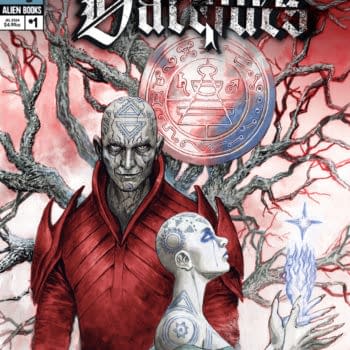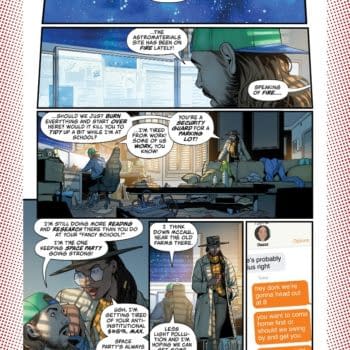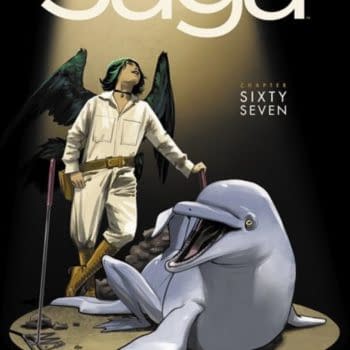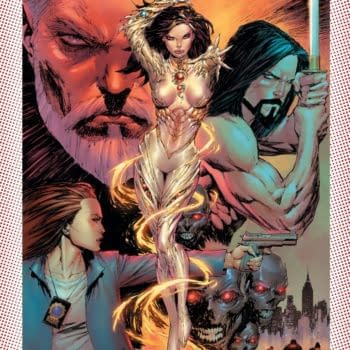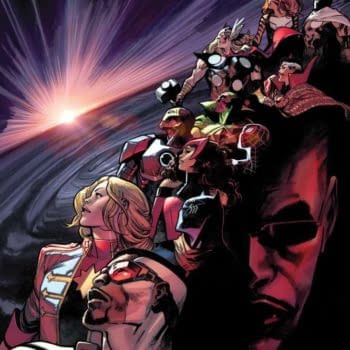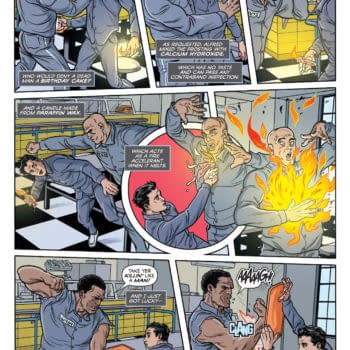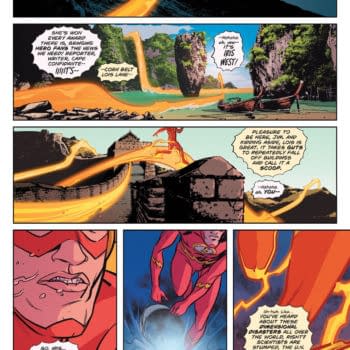Posted in: Comics | Tagged: Alan Moore, Comics, grant morrison, warren ellis
Parallel Words by Stephan Burn – When Meta Met Fiction
Stephan Burn writes for Bleeding Cool;
Irrespective of whatever differences they may have, Grant Morrison and Alan Moore, what they do have in common is that they are both British luminaries of comics with a keen interest in esoterica and magic. More than that, they both pursue theories of a meta-fictional cosmology that has threads running through all of reality. In the comic Planetary, writer Warren Ellis uses similar ideas when talking about Fictionauts, characters who use a machine to enter fictional realms and bring back artefacts. A key difference though is that Ellis hasn't made this part of his personal philosophy, unlike Moore and Morrison.
So what does these theories consist of? The metafiction is "a term given to fictional writing which self-consciously and systematically draws attention to its status as an artifact in order to pose questions about the relationship between fiction and reality". It can be observed when, either by implication or direct interaction, fictional characters interact with the real world or otherwise acknowledge their own fictional nature. This breaking of the fourth wall happens fairly regularly in comics, less so in literature and from time to time in theatre and film; Alfie is the prime example, where the eponymous protagonist addresses the audience directly. However, this is only a one way interaction, a mere narrative device. To get closer to the level Morrison and Moore operate in, we need to look at the various theories about parallel universes.
One of these theories is that there are infinite universes, with every possibility contained therein, and the totality of all of these universes is referred to as the multiverse. There would be universes where life on Earth has never evolved, where Thatcher was assassinated in her first term, where the rules of physics are different to what we know or where Bach invented trip hop. In this scenario, there could be a universe where the character of Sherlock Holmes actually exists and solves mysteries. Why not one where multiple fictional entities co-exist; where Batman races against time to stop the urban terrorist, Tyler Durden? Taken a step further there could, according to this theory, be a universe where the world is largely familiar, containing our 'real' selves but with the addition of a selection of fictional characters walking among us.
Moving away now from these purer theories, we move into more nebulous esoteria. Let us begin with the multiverse theory, but adjust it in that while there may be variations, prime concepts and prime people exist; these are prime memes, successful cultural touchstones. The theory postulates that something big, from our perspective, like the Second World War, sends ripples through all possibilities so that, on the whole, there would be many more universes where that occurred than those where it didn't. They may differ slightly in terms of its sub-events and conclusions but the memeplex of WW2 would be recognisable by those familiar with our version, the prime version, of that event.
Based on this, strongly resonating fictional memes could in effect be conjured into existence, from urban myths to Atlantis to Moore's John Constantine character. Moore in fact claims that having created this fictional magician, he ended up meeting him in person years later. Morrison treated his comic The Invisibles has a hypersigil to represent different facets of himself, in part to project himself into that world. So, not only do Morrison and Moore believe that such prime characters exist in parallel worlds but they can be ritually communicated with, they can be evoked and facets of them could exist in our own world. Furthermore, these prime myths could be the basis of whole belief systems. There are some that believe that this could be the reason for the virulence of some of our religions, the keen interest that people still have in Greek and Norse myths and the interest that some have in The Force. Alan Moore wrote in From Hell, in a line that purportedly facilitated his conversion to magical spiritualism, that "The one place gods inarguably exist is in the human mind."". Furthermore, in an interview he stated that "the IDEA of the god IS the god."
These ideas are interesting from a philosophical point of view and for the student of magical paradigms, but it adds an interesting perspective to the interpretation of their work. When they tell stories, regardless of the medium they are telling them in, they are attempting to go beyond that: they are in effect attempting a multi-universal creation of self-perpetuating myth. They are attempting to paint gods, heroes and adversaries onto the tapestries of reality. This is one of the specific reasons why Grant Morrison prefers to write in the superhero genre: to wage a memetic war on the enemies of reality. Moore's approach is somewhat different, being more interested in a wide pantheon of light and dark to strive for all times. His conversion to magical spiritualism didn't come about until 1993, after he had written bulk of the work he is famed for. But his League of Extraordinary Gentlemen, a tale bringing together multiple fictional worlds and characters into one, and Promethea both reflect his belief in these theories. He described them as the Idea Space, "…a space in which mental events can be said to occur, an idea space which is perhaps universal. Our individual consciousnesses have access to this vast universal space, just as we have individual houses, but the street outside the front door belongs to everybody. It's almost as if ideas are pre-existing forms within this space".
These concepts of self-aware ideas were of course preceded by Richard Dawkins in The Selfish Gene in his chapter on memes. He may have warned against anthropomorphising memes and certainly would have been against granting them sentience. But that's the problem with ideas: Once they're out there, they tend to take on a life of their own, whether metaphorically, or magically.







